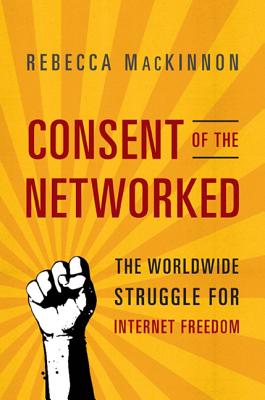The Internet was going to liberate us, but
in truth it has not. For every story about the web’s empowering role in
events such as the Arab Spring, there are many more about the quiet
corrosion of civil liberties by companies and governments using the same
digital technologies we have come to depend upon. Sudden changes in
Facebook’s features and privacy settings have exposed identities of
protestors to police in Egypt and Iran. Apple removes politically
controversial apps at the behest of governments as well as for its own
commercial reasons. Dozens of Western companies sell surveillance
technology to dictatorships around the world. Google struggles with
censorship demands from governments in a range of countries—many of them
democracies—as well as mounting public concern over the vast quantities
of information it collects about its users.
In Consent of the Networked, journalist and Internet policy specialist Rebecca MacKinnon argues that it is time to fight for our rights before they are sold, legislated, programmed, and engineered away. Every day, the corporate sovereigns of cyberspace make decisions that affect our physical freedom—but without our consent. Yet the traditional solution to unaccountable corporate behavior—government regulation—cannot stop the abuse of digital power on its own, and sometimes even contributes to it.
A clarion call to action, Consent of the Networked shows that it is time to stop arguing over whether the Internet empowers people, and address the urgent question of how technology should be governed to support the rights and liberties of users around the world.
In Consent of the Networked, journalist and Internet policy specialist Rebecca MacKinnon argues that it is time to fight for our rights before they are sold, legislated, programmed, and engineered away. Every day, the corporate sovereigns of cyberspace make decisions that affect our physical freedom—but without our consent. Yet the traditional solution to unaccountable corporate behavior—government regulation—cannot stop the abuse of digital power on its own, and sometimes even contributes to it.
A clarion call to action, Consent of the Networked shows that it is time to stop arguing over whether the Internet empowers people, and address the urgent question of how technology should be governed to support the rights and liberties of users around the world.

No comments:
Post a Comment